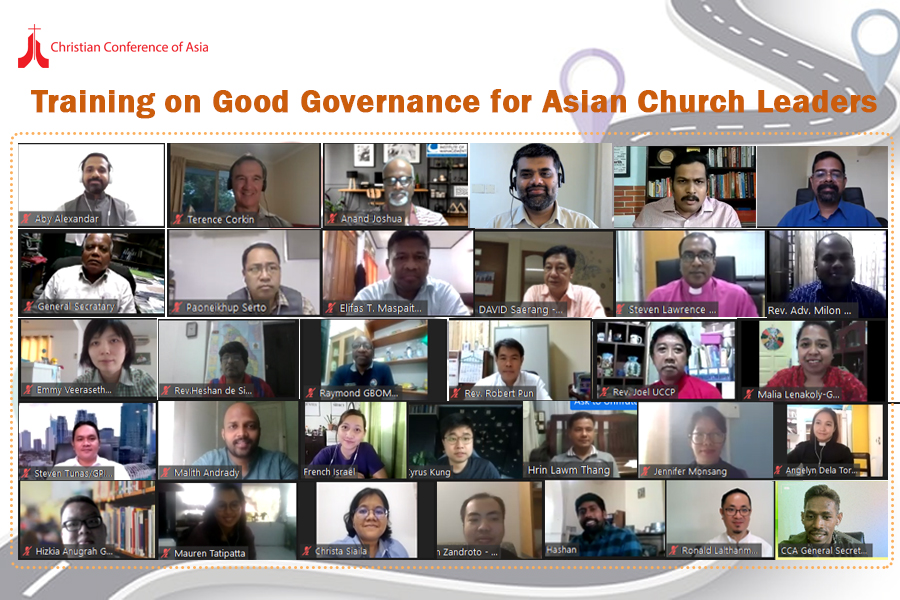Training on good governance for Asian church leaders

Participants (comprising Asian church leaders and AEI–2020 students) of the CCA Good Governance Training Programme
CHIANG MAI: The Christian Conference of Asia (CCA) organised a three-day training programme from 25–27 November 2020 for leaders of member churches and councils on “Good Governance in Churches and Related Organisations in Asia”.
Held in the online mode, the training was attended by 20 specially invited church leaders from across Asia. 36 students, prospective church and ecumenical leaders, who participated the month-long Asian Ecumenical Institute (AEI)–2020 also were part of the training.
The training programme focused on aspects of governance that are vital to the existence of any organisation and society. Governance entails the process of decision-making, and the implementation of those decisions. Good governance bears spiritual, political, economic, environmental, cultural, and social aspects; it eliminates all corruption, accounts for minority representation, and is responsive to the present and future needs of society.
In his opening remarks, the CCA General Secretary Dr Mathews George Chunakara stated, “There is a growing need for an effective governance system for churches and ecumenical organisations in Asia that will ensure efficient and effective utilisation of resources as well as proficient management practices in churches. The training is part of CCA’s efforts to aid churches in capacity-building to establish good governance, effective management, and decision making.”
Over the course of three days, the participants learnt, discussed, and deliberated upon topics such as “Theological Reflections on Good Governance”, “Good Governance: Principles and Ethics”, “Christian Values in Management”, “Human Resource Management”, “Self-Assessment Framework”, and “Qualitative Improvement in Church and Related Agencies”.
Rev. Terence Corkin, a minister from the Uniting Church in Australia, laid the foundation for the training programme. He provided the theological basis for the meaning and characteristics of good governance. He said that good governance implied putting in place effective systems and big-picture policies, maintaining and monitoring organisational culture and performance, ensuring compliance with the law, communicating with stakeholders, and evaluation, among others.
Rev. Corkin described the characteristics of good governance as: accountable and transparent, responsive and open to new information and opinions, equitable and inclusive, effective and efficient, participatory, and balanced with mission.
Aby Alexander of the Christian Institute of Management in India, spoke about the Christian approach to Management, which he explained in light of the values and principles of the Scriptures. He proposed an approach to the re-reading of the Bible from a management point of view, thus drawing out lessons using hermeneutical principles for modern-day management. He explained the methodology for ensuring stewardship and accountability in governance, and maintaining integrity, structure, control systems, reporting, financial management, and human resource development.
Sony Thomas, a Leadership Trainer and Coach from “Celebrating Life”, shared the importance, relevance, and core principles of leadership. He spoke of the need for strong character and competency, and said that the hallmark of a true leader was their skill in making more leaders. He said that the tasks a good leader necessarily maintained connections and a sense of community, inspired the people to buy into their vision, and empowered others to reach their full potential.
Arpit Waghmare spoke about how networking and partnership drove the effectiveness of Christian ministry. He explained the need for building networks and partnership as the biblical imperative, referring to love, unity, and diversity in the body of Christ.
He challenged participants to articulate the hindrances in the way of establishing meaningful partnerships within Christian organisations, which he specified as theological differences, sharing of resources, and safeguarding of reputation, relationships, and credibility. He also reiterated that all were both objects as well as agents of reconciliation, and hence were called to engage with others as part of mission.
Daniel Jacob, of EC Group, talked about staff capacity-building, which was the key driver for adaptation to change.
Jacob further emphasised human resources development which included self-development, skills, development of various abilities, and self-reflection. Furthermore, he explained capacity-building as the process of developing the strength and sustainability of an organisation, enabling the organisation to focus on its mission, and not simply on its survival.
He shared the importance of hiring the right people and putting them in right positions, in accordance with the culture and values of the organisation.
Anand Joshua, of the Christian Institute of Management in India, spoke of the qualitative improvement in the church and its related organisations.
He said that governance was guided by the principles of stewardship and emphasised the necessity of maintaining clarity in the organisation’s vision, mission, and core values. He pointed out that good governance was visible in the day-to-day tasks of engagement (awareness, ownership, processes), development (formulation, strategic planning), execution (implementation, programming, delivery), and monitoring and evaluation (review, impact, reformation, learning), as well as in developing monitoring mechanisms.
The discussions among the participants centred around the best practices and processes among their organisations. They developed action plans to apply within their local contexts and renewed their commitments to upholding the principles of good governance.










